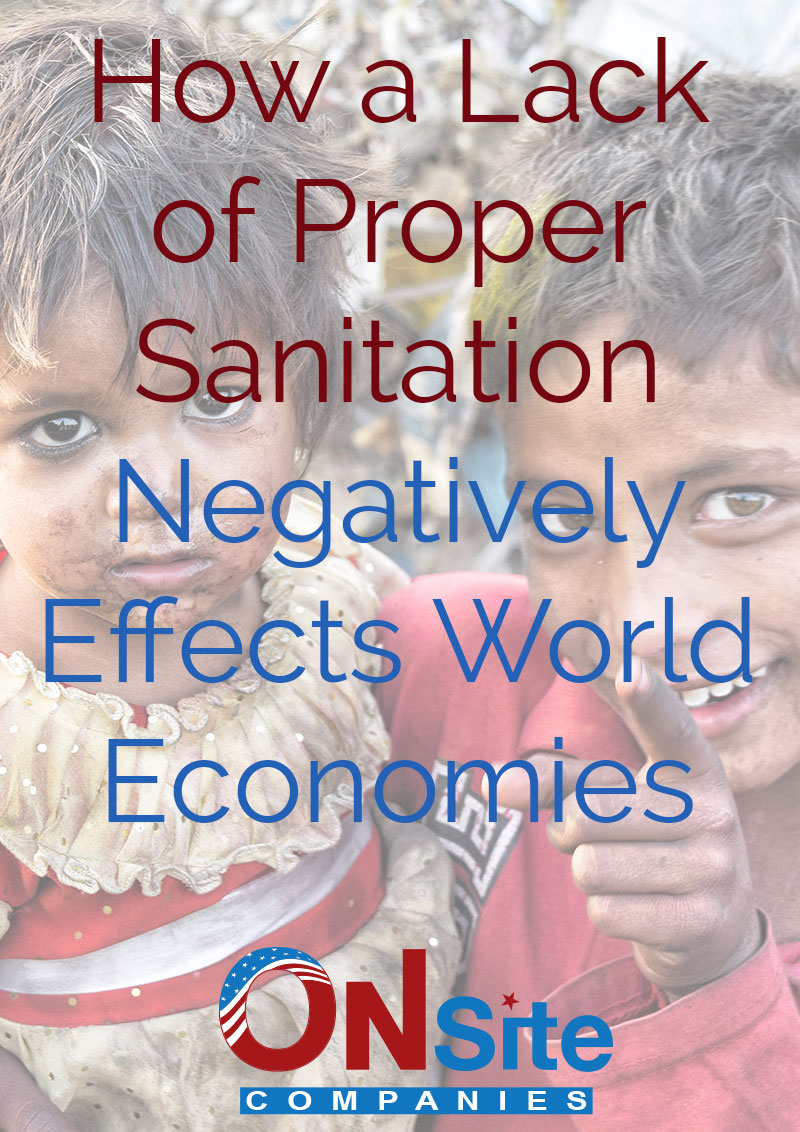Portable Sanitation may not be the first thing you think of when considering economic improvement in the third world. If you really think about it though, proper sanitation has a huge impact on the lives of people living in these distressed areas. Lack of proper sanitation contributes to a lot of economic stress that are not immediately evident. Improving sanitation could have a large positive economic impact around world economies.

The Millennium Development Goals
The United Nations created their Millennium Development Goals which included provision 7.c. This goal is to “halve, by 2015, the proportion of the population without sustainable access to safe drinking water and basic sanitation.” According to the U.S. National Library of Medicine, failing to meet these goals could cause $38 billion worth of ramifications around the world, and lack of sanitation accounts for 92% of these losses.
Between 1990 and 2015 2.6 billion people have gained access to improved drinking water sources and 2.1 billion have gained access to improved sanitation. Despite all of this progress, 2.6 billion people still don’t have access to improved sanitation according to the World Health Organization.
Improved Sanitation is defined as a mechanism that separates human excreta from human contact. Improved sanitation can include anything from a standard flush toilet to portable restrooms and outhouses. Lack of improved sanitation is one of the heaviest disease burdens worldwide.
How Lack of Sanitation Affects Economics
So we know that the world has a serious lack of sanitation, but how does that factor into the country’s economic outlook? Most of the losses occur for the following reasons:
- Healthcare costs and loss of productivity
- Decrease rates of education opportunities
- Loss of key water resources
- Lack of tourism
Economic Loss from Disease and Health Concerns
The lack of sanitation throughout the world is a large cause of disease and illness. This lack of basic drinking water sources and latrines are the main cause of 1.6 million deaths from diarrheal diseases, 133 million cases of intestinal helminths infections, and 240 million cases of schistosomiases every year.
All of these illness mean that a lot of these people are burdened with healthcare costs that either come out of pocket or from government / third party providers. This is money that could be spent elsewhere, but is instead spent to treat preventable diseases. Not only is the money lost directly from healthcare costs, but it is also lost indirectly from loss of productivity. When these people or their families get sick, they have to take time off work for recovery. Simply providing improved sanitation could eliminate these losses and allow people to thrive.
Economic Loss from Lack of Education
Educating a population is where innovation comes from, and when a community doesn’t have proper sanitation education can suffer. People need to meet the needs of wellness, food and water before they can worry about getting to school. If these populations are worrying more about where their clean water is going to come from, they can’t exactly focus on their education.
Also, in areas that lack private and proper sanitation, young girls are less likely to attend school. Because of fear or violence, these girls may decide to stay at home instead of getting their education. According to worldbank.org, for every 10% increase in female literacy (due to increased school attendance where proper sanitation facilities exist), a country’s economy could grow by 0.3%. When it comes to national economies, .3% grown can mean real money and real prosperity for its citizens.
Economic Loss from Damaged Water Resources
Most areas without improved latrines have serious issues with pollution in their local waterways. These water resources are extremely important to these communities for drinking water, food production and exporting opportunities. Because their water supplies are polluted, they may need to bring in fresh drinking water from elsewhere. Local fisheries are also damaged meaning food sources will need to also be brought it. Loss of fisheries also decreases opportunities for exports. It also makes it difficult to cultivate crops with using local resources.
Economic Loss from Lack of Tourism
Tourism is can quickly stimulate a local economy. It provides jobs for local shops, hotels, restaurants and leisure activities. When a country lacks proper sanitation, it becomes almost impossible to attack tourists to the region. Travelers will most likely not want to travel to countries with high levels of disease. Lack of facilities and clean food and water are also reasons tourists are turned off by these regions. By improving sanitation, people may be more willing to consider traveling to these regions. An increase in tourism will create jobs and opportunities for the country that weren’t imaginable before.
Access to sanitation not only improves to quality of life for people around the world, it also provides economic incentives to countries. From improving the health and productivity of workers to attracting tourists, sanitation can greatly change the bottom line for local economies.
On Site Companies is a portable restroom provider for both construction and special events. If you have more questions about portable restrooms, or you’d like to order one in the Minneapolis / St. Paul, Rochester MN, Mankato MN, or St. Louis MO area, please reach out to us through phone at 1.800.210.8407 or email at sales@onsiteco.com.
For more information about portable sanitation around the world, visit psai.org